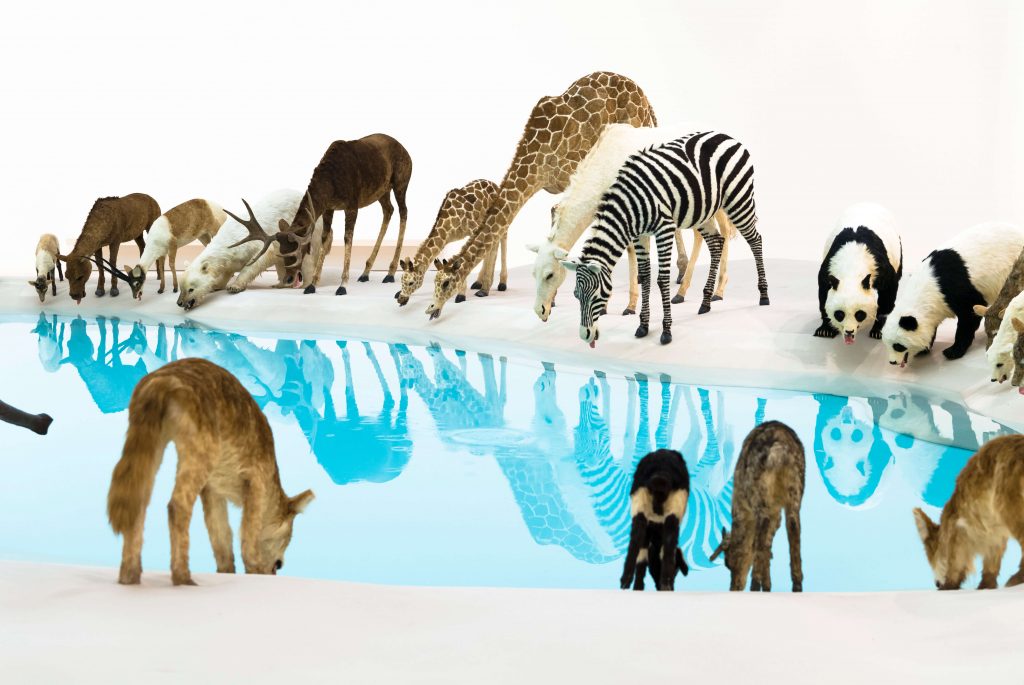It seems timely that as much of Australia is ablaze with unprecedented bushfires, we contemplate the enigma of their elemental opposite: water. The life-source of all living things on earth, water is the centre of our survival as well as our culture. In the heat of summer in tropical Brisbane, the Queensland Art Gallery | Gallery of Modern Art (QAGOMA) presents Water; bringing together almost 100 artworks by over 30 artists that speak to water’s varied and complex significance.

Installed with artificial watering hole: water, sand, drip mechanism, © The artist, Photograph: Natasha Harth, QAGOMA
The exhibition, which fills the entirety of the gallery’s ground floor, commences with the specially-commissioned artwork RE FORMATION (2019) by Quandamooka artist Megan Cope. The work, a mountainous installation consisting of carefully layered cast-concrete oyster shells, presents a portrait of what is to come. On one hand, the multitude of shells is a metonym for aquatic life and the food that sustains us. On the other, it is a recognition of the cultural practices associated with water performed by First Nations people for thousands of years. Prior to colonisation, mollusc shells and bones would be discarded together to form middens; these served a multitude of purposes including signposting recent activity (to prevent over harvesting), providing windbreaks, and being important deposits of calcium.
The exhibition continues on in five themes (a rising tide, deep, pulse, cycles and held) and is punctuated by several large-scale installation works. Highly notable is Riverbed (2014) by Danish-Icelandic artist Olafur Eliason which is an impressively vast re-creation of a rocky glacial landscape complete with a trickling stream. The immersive artwork’s construction involved over 100 people and more than 110 tonnes of rock. Another highlight is Chinese artist Cai Guo-Qiang’s installation Heritage (2013) which consists of 45 life-sized animals gathering around a watering hole. These two artworks speak to the preciousness of water in nature through their uncanniness. Admittedly, however, it may be the snowman trapped in a fridge that viewers find even more unusual (as is the case with Peter Fischli and David Weiss’ Snowman).
The most lingering part of Water is its perspectives on climate change; the rise of sea levels due to global warming pose an immediate threat particularly to communities in the Pacific and in low lying attols. Angela Tiatia’s artwork Holding on (2015), which was produced in Tuvalu, for example, is a meditative and absorbing video of waves crashing over her still body and increasingly consuming her. As the curator of Water Geraldine Kirrihi Barlow explains “We evolved from water to breathe air, now we must find new ways to look out for each other, new ways to move and work together to meet the challenge of climate change.”
Tips for a visit to QAGOMA
QAGOMA is located in South Bank, the cultural precinct of Brisbane. A trip to the gallery could be easily paired with a stop at the State Library of Queensland next door, a visit to the Queensland Museum, or an evening performance at Queensland Performing Arts Centre (QPAC). And if you’re in need of a place to stay, there is nowhere trendier than the Calile Hotel in the upmarket lifestyle and entertainment area of James St in Fortitude Valley.